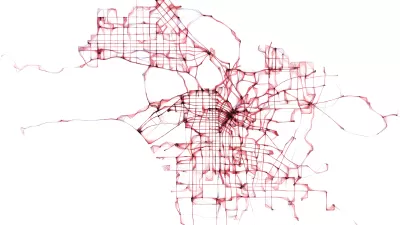Azeen Ghorayshi looks at how Oakland's civic hackers are trying to change the city through technology -- giving people greater access to data, increasing transparency, and keeping people better informed -- all with minimal investment by the city.
In 2007, Michal Migurski took an outdated and cumbersome city crime-mapping website that "contained useful information" and converted it into "Oakland Crimespotting" a far more successful website "that allows people to track crimes by date, neighborhood, and crime type, all laid out on a relatively intuitive interactive map," writes Ghorayshi. The only caveat: He did it by hacking into the city's data. After some initial reservations, the city became welcoming of Migurski's efforts, and forged an enduring partnership with him and his hacker colleagues.
Migurski's site is just one example of Oakland's "breakthroughs in civic hacking," and of the national trend towards greater use of technology to create better cities. "The idea [behind the open data movement] is that data — whether on crime, budgets, liquor licenses, or disease outbreaks — can be organized and presented in a way that's more useful to the public. And giving people greater access to data not only increases transparency, but it also makes people better informed. The ultimate goal is to create a more engaged citizenry, which, in the grandest Obama vocabulary of the movement, is 'the essence of democracy.'"
Ghorayshi points to cities such as Boston and Philadelphia, which are now funding in-house, but low-cost, research and development departments that aim to "[b]ring together civic hackers, fiddle with existing code, and test out new ways of solving old problems." This response has also become popular as a way of being able to "do more with less" in the face of shrinking municipal budgets and staffs.
When considering the future of Oakland Crimespotting, Migurski says, "I don't think it's particularly sustainable." He adds, "My sense about the civic coding thing is that you still need people who have the itch, interest, and energy to bring the data out in the open and show there's a demand there, and then over time it will be a thing that is expected of cities to provide for their citizens." He concludes, "This isn't a cool faddish new thing; it's a thing like police, fire, and transit that citizens need. It's a responsibility that governments have, especially with something like crime. You already run the police, you already collect that data, so it makes sense that the people who collect that data should also be responsible for sharing it with the public."
FULL STORY: Cracking Oakland's Code

Alabama: Trump Terminates Settlements for Black Communities Harmed By Raw Sewage
Trump deemed the landmark civil rights agreement “illegal DEI and environmental justice policy.”

Planetizen Federal Action Tracker
A weekly monitor of how Trump’s orders and actions are impacting planners and planning in America.

The 120 Year Old Tiny Home Villages That Sheltered San Francisco’s Earthquake Refugees
More than a century ago, San Francisco mobilized to house thousands of residents displaced by the 1906 earthquake. Could their strategy offer a model for the present?

Opinion: California’s SB 79 Would Improve Housing Affordability and Transit Access
A proposed bill would legalize transit-oriented development statewide.

Record Temperatures Prompt Push for Environmental Justice Bills
Nevada legislators are proposing laws that would mandate heat mitigation measures to protect residents from the impacts of extreme heat.

Downtown Pittsburgh Set to Gain 1,300 New Housing Units
Pittsburgh’s office buildings, many of which date back to the early 20th century, are prime candidates for conversion to housing.
Urban Design for Planners 1: Software Tools
This six-course series explores essential urban design concepts using open source software and equips planners with the tools they need to participate fully in the urban design process.
Planning for Universal Design
Learn the tools for implementing Universal Design in planning regulations.
Clanton & Associates, Inc.
Jessamine County Fiscal Court
Institute for Housing and Urban Development Studies (IHS)
City of Grandview
Harvard GSD Executive Education
Toledo-Lucas County Plan Commissions
Salt Lake City
NYU Wagner Graduate School of Public Service




























